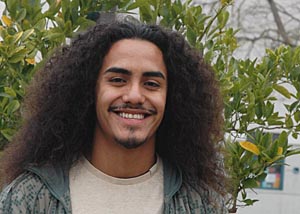Angel Martinez was 12 years old when his baby sister was born four months premature. So tiny she would've fit in the palm of his hand, baby Dilia was kept in isolation and wouldn't know her brother's touch for two months.
Today, Dilia is a happy 9-year-old, with few traces of those trying months, and Martinez credits her with shaping his own life. "Seeing the struggle my sister went through just to be alive was not just inspiring, but a driving force today," he said. "That's when I decided I wanted to be a doctor. I wanted to know what was going on with her."
A senior at UCSC, Martinez is majoring in health sciences and community studies on his way to earning a M.D. and a master's in public health.
"For me, medicine and community work together," said Martinez, who just became the first UCSC student selected to participate in the prestigious Barbara Jordan Health Policy Scholars Program in Washington, D.C. One of only 15 scholars chosen from 350 applicants, Martinez will spend nine weeks learning about health policy, particularly issues that affect minorities and underserved communities. It is an opportunity tailored to the interests of Martinez, who says medical care, and disparities in access to care, reflect the strengths and weaknesses of the entire society.
"Medicine is a commodity now, and people don't have access to it. They can't afford it," said Martinez. "To get to the root of the disparities in health care, you have to understand the social science part of it. That's just as important as the science. You can't have one without the other."
Fortunately, Martinez's parents had health insurance by the time Dilia was born, but Martinez wonders whether environmental factors contributed to the premature births of four of their seven children, one of whom didn't survive, or to the multiple miscarriages his mother suffered. His need to know fuels his educational drive today, but it hasn't always been that way, according to Martinez.
A native of East Los Angeles, a predominantly Latino city six miles east of downtown, Martinez grew up playing soccer, baseball, and basketball, but school wasn't a priority.
"I was doing horribly in school," he recalled. "I barely got through second through sixth grade." His parents, who had immigrated to the United States from Mexico as children, had never attended college, and they wanted more for their children. They chose an unusual avenue for Martinez: They sent him to the city pool to play water polo. Martinez grins as he tells the story, acknowledging the incongruity of a kid from East L.A. embracing a sport associated with tony suburbs and prep schools.
"It went from a hobby to being my life--I stopped going out with friends because I was always at the pool. It's where I learned discipline, teamwork, and working with other people," he said. "It pulled me away from the street environment I could've fallen into. I found another way to release my energy."
Martinez liked the intensity of water polo, which challenged his physical capabilities, and it also opened new doors. He enrolled at Cathedral High School in downtown Los Angeles, one of the few schools that offered the sport, and he joined an elite club team, the Commerce Aquatics, that competed nationally. "I went to Hawaii twice and to Florida," recalled Martinez.
Competing on all-Latino teams in the white-dominated sport also exposed Martinez to racism for the first time. "It ticked people off to lose to a team like ours," he said.
At UCSC, Martinez was the only nonwhite player on the water polo team, but playing college water polo "was a dream," he said. The Slugs won the Division Three national championship during his third year, and last fall, he wrapped up his fourth and final year with the team.
"I had the largest culture shock when I came to this city," recalled Martinez, who said the campus looked to him like a farm. He missed his family, his neighborhood, and he missed speaking Spanish.
Martinez enrolled in pre-med classes but found his footing through friends and by taking classes in Latin American and Latino studies, getting involved with Chicano Teatro, Chicanos/Latinos for Health Education (CHE), and MEChA, the Movimiento Estudiantil Chicano de Atzlan, the Chicano student organization.
Community studies classes rounded out his academic program, and faculty mentors reinforced his commitment to serving others. "The thing that drives me the most is my family," he said. "I'm not just doing this for myself. I'm doing it for people back home. If I can do it, anybody else can, too."
Martinez will complete his spring-quarter classes from Washington, D.C., because the health policy program begins in mid-May. A demanding program, participants must draft a policy memo and make a public presentation as part of the requirements. Scholars reside at Howard University and receive full support, including a $2,000 stipend upon completion.
Martinez will work in the offices of Congresswoman Hilda Solis, chair of the Congressional Hispanic Caucus Health Task Force. Flashing a broad smile, he said he has made peace with the prospect of wearing a shirt and tie, dress shoes, and tying back his long, curly hair to work in the nation's capital.
"As students of color, we need to get over the fear that keeps us from doing something and just do it," he said. "Timidness is not an excuse for not participating. We're valuable."



